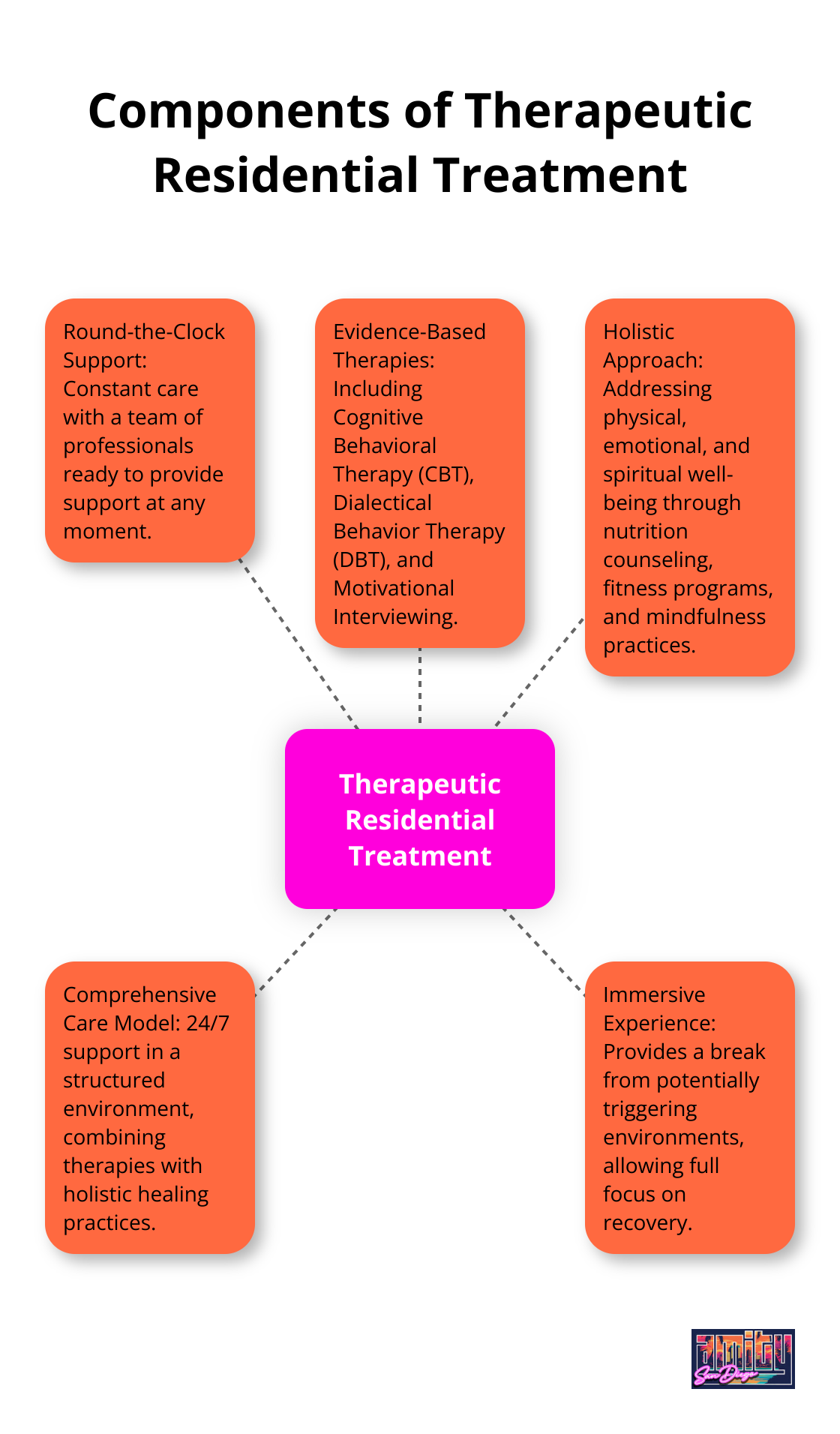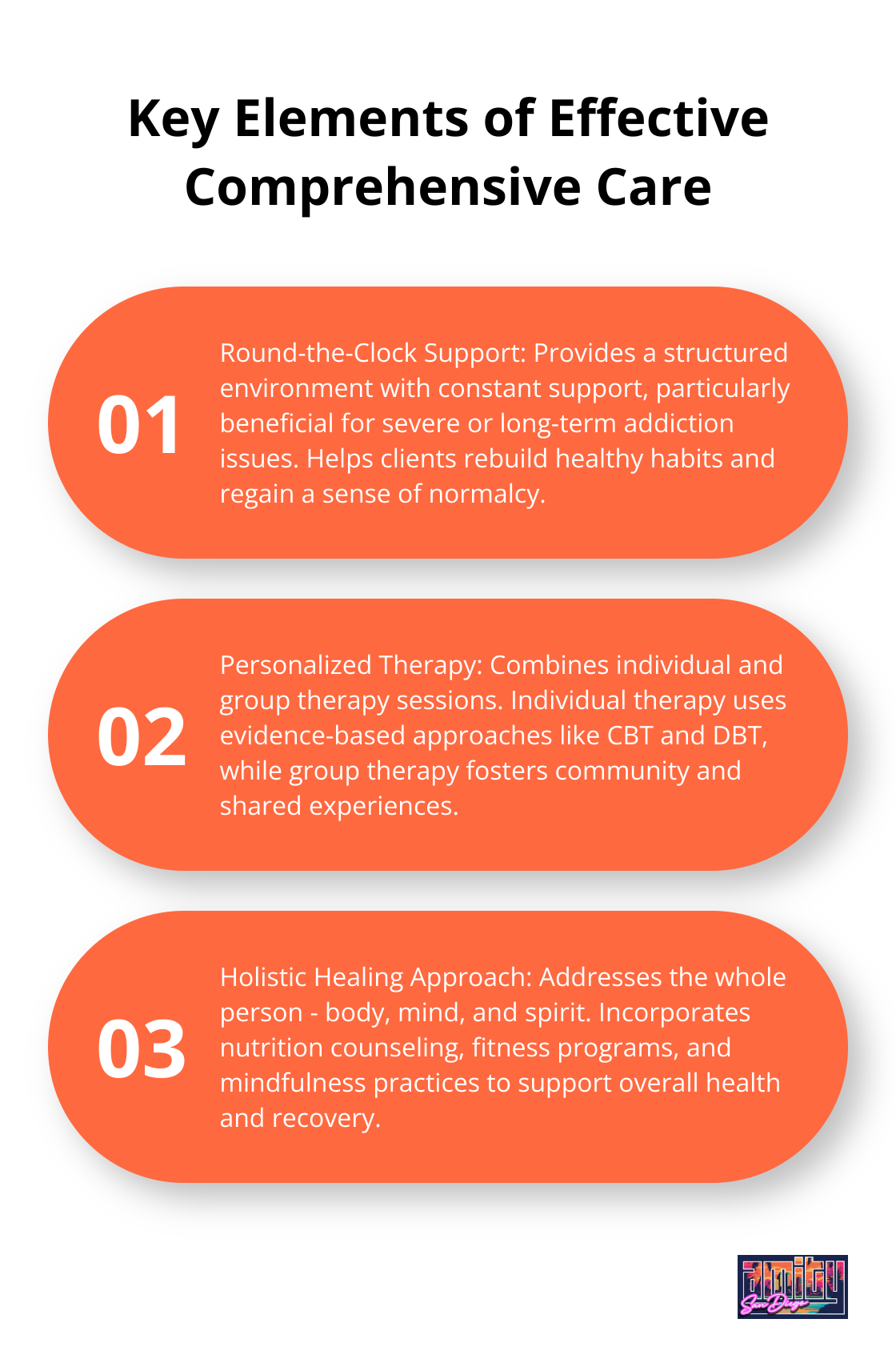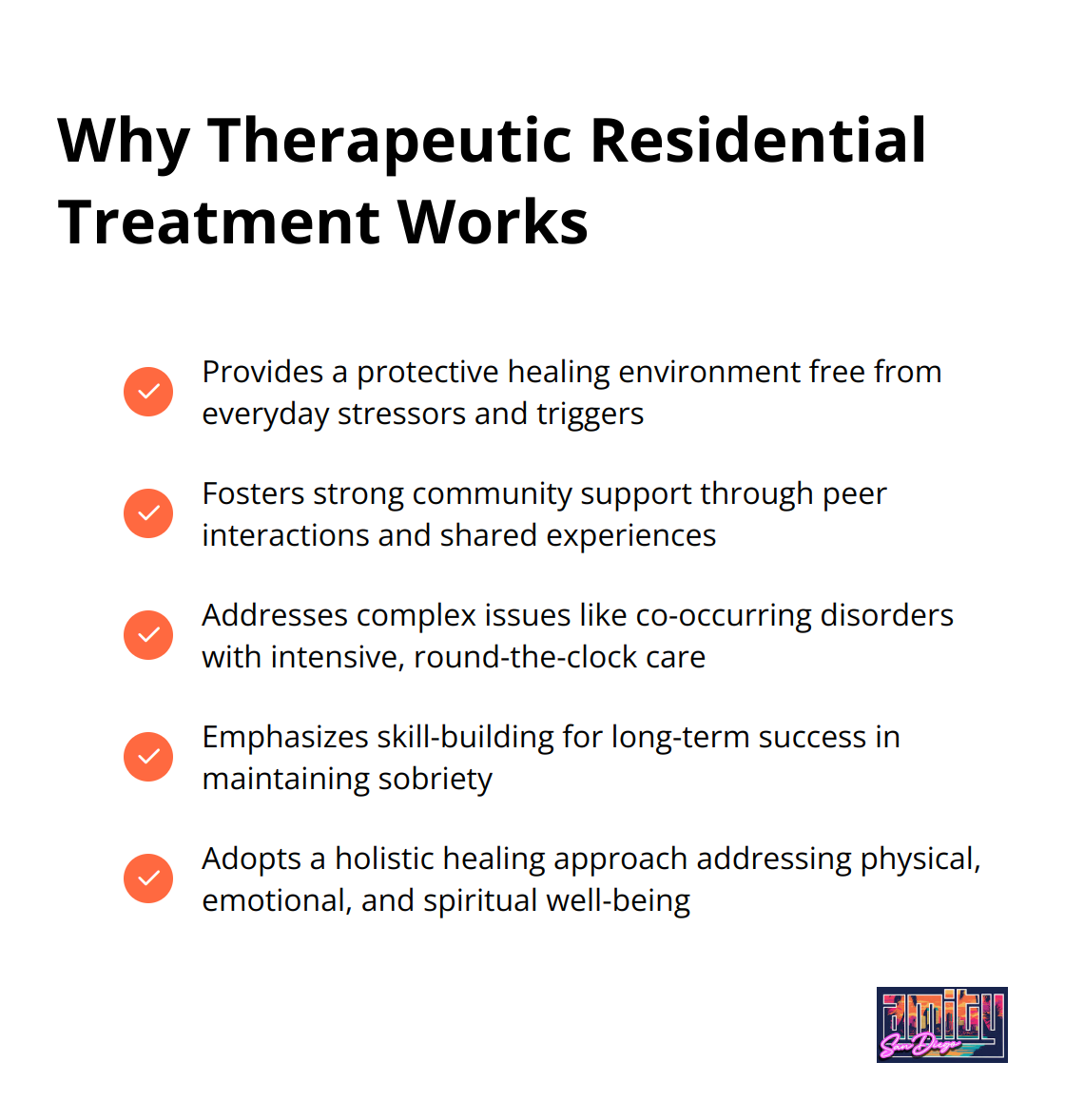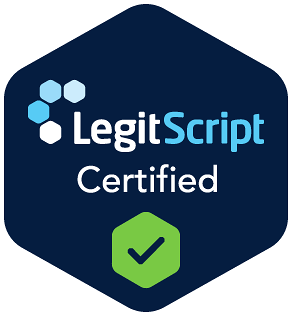At Amity San Diego, we’ve seen firsthand the transformative power of therapeutic residential treatment programs. These comprehensive care approaches offer a unique path to recovery for individuals facing complex challenges.
Therapeutic residential treatment combines round-the-clock support with evidence-based therapies in a structured environment. This blog post explores the key elements and benefits of this intensive care model, shedding light on why it’s an effective option for those seeking lasting change.
What is Therapeutic Residential Treatment?
Comprehensive Care Model
Therapeutic residential treatment offers a comprehensive approach to addiction recovery. This intensive care model provides 24/7 support in a structured environment, combining evidence-based therapies with holistic healing practices.
Round-the-Clock Support
Unlike traditional outpatient programs, therapeutic residential treatment offers constant care. Clients live on-site, surrounded by a team of professionals ready to provide support at any moment. This level of care benefits those with severe addiction or co-occurring mental health disorders (often referred to as dual diagnosis).

Evidence-Based Therapies
At the core of therapeutic residential treatment are evidence-based therapies. These include:
- Cognitive Behavioral Therapy (CBT)
- Dialectical Behavior Therapy (DBT)
- Motivational Interviewing
Treatment enables people to counteract addiction’s disruptive effects on their brain and behavior and regain control of their lives.
Holistic Approach
Therapeutic residential treatment addresses more than just addiction. It takes a holistic approach, focusing on physical, emotional, and spiritual well-being. This may include:
- Nutrition counseling
- Fitness programs
- Mindfulness practices
- Creative therapies
Recovering from a drug or alcohol addiction is a gradual process. It is a challenge that requires strength, determination, and perseverance.
Effective for Complex Issues
Therapeutic residential treatment works particularly well for individuals dealing with complex issues such as:
- Severe substance use disorders
- Co-occurring mental health conditions
- Chronic relapse
- Trauma-related disorders
Residential treatment for substance use disorders has been shown to be effective in addressing complex issues.
Immersive Experience
While outpatient programs allow clients to maintain their daily routines, therapeutic residential treatment provides a break from potentially triggering environments. This immersive experience allows individuals to focus entirely on their recovery without external distractions or stressors.
It’s important to note that therapeutic residential treatment isn’t a one-size-fits-all solution. The length of stay and specific treatment components vary based on individual needs. Some programs last 30 days, while others extend to 90 days or more.
As we move forward, let’s explore the key elements that make comprehensive care in residential treatment so effective.
What Makes Comprehensive Care Effective?
At Amity San Diego, we see comprehensive care in residential treatment as the foundation of successful recovery. Our approach combines several key elements that create a powerful healing environment.
Round-the-Clock Support in a Structured Setting
Substance abuse intensive outpatient programs (IOPs) are ambulatory services for individuals with substance use disorders who do not meet diagnostic criteria for residential or inpatient treatment. However, our residential treatment provides a more structured environment with constant support, which can be particularly beneficial for those with severe or long-term addiction issues.
Our structured daily routines help clients rebuild healthy habits and regain a sense of normalcy. Every aspect of the day (from scheduled meal times to therapy sessions and recreational activities) supports recovery.
Personalized Therapy: Individual and Group Sessions
We value both individual and group therapy. One-on-one sessions allow for deep, personalized work on specific issues, while group therapy provides peer support and shared learning experiences.
In individual therapy, we use evidence-based approaches like Cognitive Behavioral Therapy (CBT) and Dialectical Behavior Therapy (DBT). CBT can be a very effective treatment for mental disorders and addiction, either alone or in combination with other therapies. It helps those in early recovery develop coping strategies and change negative thought patterns.
Group therapy sessions foster a sense of community and shared experience. They provide a safe space for clients to practice new social skills and receive feedback from peers.
Holistic Healing: Beyond Addiction Treatment
Our holistic approach addresses the whole person – body, mind, and spirit. We incorporate nutrition counseling, fitness programs, and mindfulness practices into our treatment plans.
Proper nutrition heals the body after substance abuse. Our on-site nutritionists create meal plans that support recovery and overall health. Regular exercise improves physical health, boosts mood, and reduces stress. Mindfulness practices (like meditation) help clients develop greater self-awareness and emotional regulation skills.
Family Involvement: A Key Component
We strongly believe in the importance of family involvement in the recovery process. Family therapy sessions repair relationships damaged by addiction and educate loved ones about the recovery process.
Family psychoeducation has been shown to increase medication and behavioral treatment adherence and outcomes. This underscores the importance of involving family members in the treatment process.
Planning for the Future: Aftercare and Relapse Prevention
Recovery doesn’t end when residential treatment does. We put a strong emphasis on aftercare planning and relapse prevention strategies.
Our aftercare plans are individualized, taking into account each client’s unique needs and circumstances. We help clients identify potential triggers and develop coping strategies to manage them. We also connect clients with local support groups and outpatient services to ensure ongoing support after they leave our facility.

This multifaceted strategy gives our clients the best possible chance at long-term recovery and a fulfilling life beyond addiction. Now, let’s explore the specific benefits that therapeutic residential treatment offers to individuals seeking recovery.
Why Therapeutic Residential Treatment Works
At Amity San Diego, we witness the transformative power of therapeutic residential treatment for those battling addiction. This intensive approach offers unique advantages that distinguish it from other treatment models.
A Protective Healing Environment
Therapeutic residential treatment establishes a protective environment where clients focus solely on recovery. This immersive setting eliminates everyday stressors and triggers that often impede recovery efforts. Research suggests that extended stays in treatment (6 months or more) correlate with improved outcomes in terms of alcohol and drug use, employment, and self-efficacy. This prolonged period allows for profound healing and the establishment of new, healthy habits.
The Strength of Community Support
One of the most potent aspects of residential treatment lies in the community it fosters. Clients reside alongside others facing similar challenges, creating a built-in support network. This peer support proves incredibly motivating and validating. Research in the Journal of Substance Abuse Treatment highlights the importance of mutual-help organizations, such as Alcoholics Anonymous (AA), as vital resources of social support for many recovering individuals.
Addressing Complex Issues
For individuals grappling with co-occurring disorders or severe addiction, the intensive nature of residential treatment often becomes necessary. The round-the-clock care enables close monitoring and immediate intervention when needed. This level of support proves crucial for managing withdrawal symptoms, mental health crises, or intense cravings that might otherwise lead to relapse.

Residential treatment also provides the time and space to tackle underlying issues that fuel addiction. These complex problems (such as unresolved trauma, chronic pain, or mental health disorders) require focused attention that’s difficult to achieve in outpatient settings.
Skill-Building for Long-Term Success
Therapeutic residential treatment emphasizes the development of essential life skills. Clients learn coping mechanisms, stress management techniques, and relapse prevention strategies. These skills prove invaluable for maintaining sobriety long after leaving the treatment facility.
Holistic Healing Approach
Many residential treatment programs (including ours at Amity San Diego) adopt a holistic approach to recovery. This comprehensive strategy addresses not only the addiction itself but also the physical, emotional, and spiritual aspects of well-being. Nutrition counseling, fitness programs, and mindfulness practices often complement traditional therapy, promoting overall health and resilience.
Final Thoughts
Therapeutic residential treatment programs transform lives through comprehensive care. These programs address addiction and co-occurring mental health issues with personalized support, evidence-based therapies, and a holistic approach. Clients benefit from a structured environment that fosters deep healing and skill development for long-term recovery.
The immersive nature of these programs provides a unique opportunity for individuals to focus entirely on their recovery journey. Clients build strong support networks, develop essential coping mechanisms, and address underlying issues that contribute to addiction. This intensive approach often leads to more sustainable outcomes compared to less comprehensive treatment options.
If you or a loved one considers addiction treatment San Diego options, we at Amity San Diego stand ready to help. Our team offers personalized, evidence-based treatment in a supportive environment. We guide individuals through the recovery process, providing the tools needed for lasting change (and hope for a brighter future).



